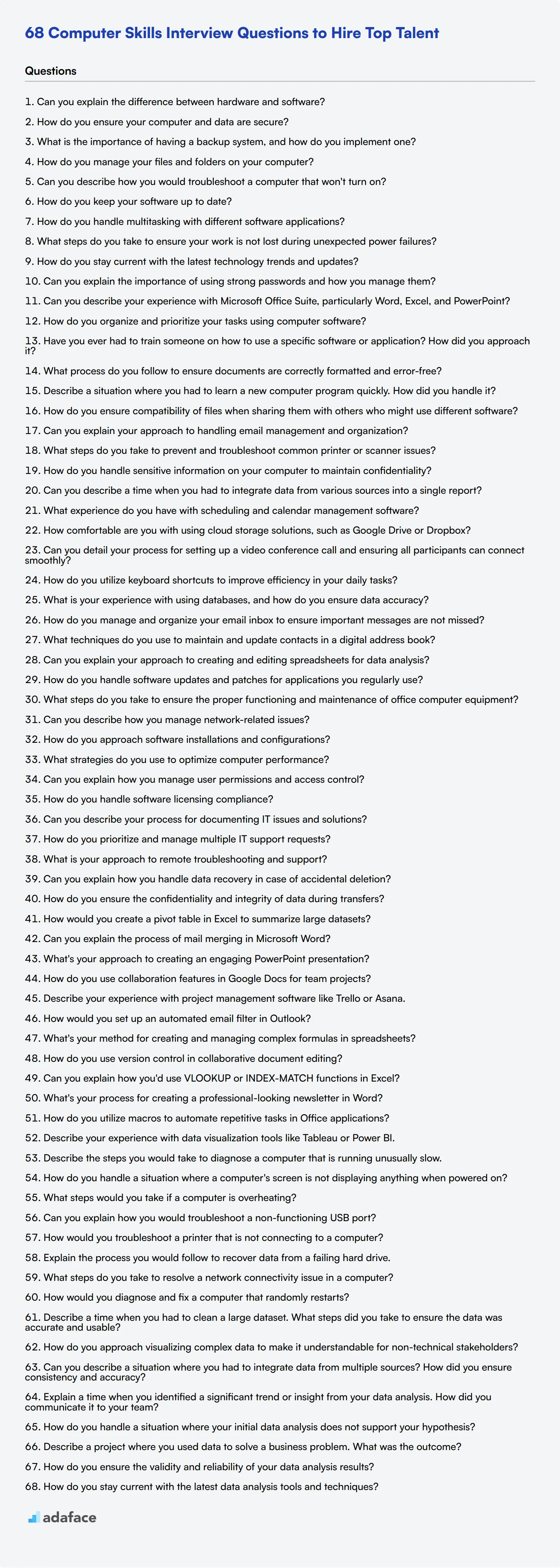Finding the right candidate with strong computer skills is a common challenge for recruiters and hiring managers. Properly assessing these skills ensures a smoother onboarding and job performance, saving time and resources in the long run.
This blog post provides a curated list of computer skills interview questions for various roles and expertise levels. Whether you're hiring a junior admin assistant or a top data analyst, these questions will guide you in evaluating candidates effectively.
Use these interview questions to identify the best talent for your organization. Additionally, consider using Adaface's computer skills tests prior to interviews for a more thorough assessment.
Table of contents
10 basic Computer Skills interview questions and answers to assess candidates
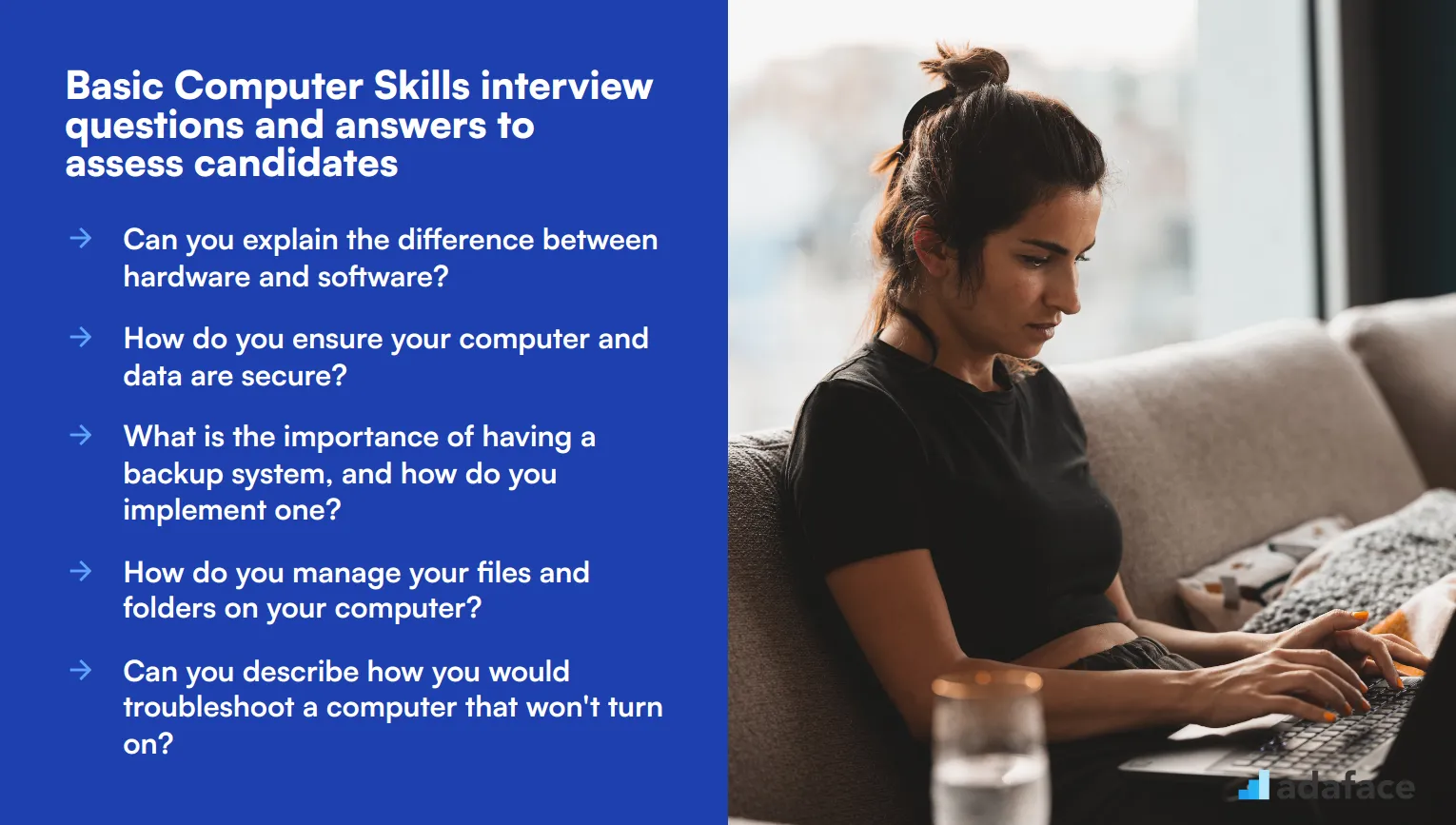
To determine whether your candidates have essential computer skills for the job, you can ask them these practical and straightforward questions. This list will help you evaluate their proficiency without getting too technical, making it perfect for face-to-face interviews.
1. Can you explain the difference between hardware and software?
Hardware refers to the physical components of a computer, such as the monitor, keyboard, and hard drive. These are the tangible parts you can actually touch.
Software, on the other hand, consists of the programs and applications that run on the hardware. Examples include operating systems like Windows and applications like Microsoft Word.
Look for candidates who can clearly differentiate between the two and provide examples. This demonstrates a fundamental understanding of computer basics.
2. How do you ensure your computer and data are secure?
To ensure computer and data security, I regularly update my operating system and software to protect against vulnerabilities. I also use strong, unique passwords and enable two-factor authentication wherever possible.
Additionally, I use antivirus software and regularly back up my data to an external drive or cloud service. Being cautious about clicking on suspicious links and emails is also part of my security routine.
Candidates should mention a combination of software tools and personal practices to demonstrate their awareness of cybersecurity best practices.
3. What is the importance of having a backup system, and how do you implement one?
Having a backup system is crucial to prevent data loss due to hardware failures, accidental deletions, or cyber-attacks. It ensures that you can recover important files and continue your work with minimal disruption.
To implement a backup system, I use cloud services like Google Drive or Dropbox for real-time backups. I also keep periodic backups on an external hard drive. Setting up automatic backup schedules helps ensure regular backups without manual intervention.
A strong answer will include both cloud-based and physical backup solutions and emphasize the importance of regular backups.
4. How do you manage your files and folders on your computer?
I manage my files and folders by creating a clear, organized directory structure. I use descriptive names for folders and files, making it easier to locate them later. For instance, I have separate folders for work, personal documents, and projects.
I also regularly clean up and archive old files to keep my system uncluttered. Using search functions and tagging files with metadata helps me quickly find what I need.
Ideal candidates will demonstrate an organized approach to file management and mention practices that enhance efficiency, such as tagging and regular clean-ups.
5. Can you describe how you would troubleshoot a computer that won't turn on?
First, I would check if the computer is properly plugged into a power source and whether the power outlet is working. Then, I would inspect the power cable and adapter for any visible damage.
If the computer still doesn't turn on, I would try to reset it by holding down the power button for a few seconds. If it's a laptop, removing the battery and pressing the power button can sometimes help.
Candidates should show a systematic approach to troubleshooting and mention checking both hardware and power sources. This demonstrates their problem-solving skills and technical know-how.
6. How do you keep your software up to date?
I enable automatic updates for most of my software, including the operating system and applications. This ensures that I receive the latest security patches and feature improvements without having to manually check for updates.
For software that doesn't support automatic updates, I regularly visit the developer's website to download and install the latest versions. Keeping an eye on tech news also helps me stay informed about important updates.
Look for candidates who understand the importance of timely updates and have a proactive approach to maintaining their software.
7. How do you handle multitasking with different software applications?
I use the task manager or activity monitor to keep track of all running applications and their resource usage. This helps me prioritize and close unnecessary applications to ensure my system runs smoothly.
Using keyboard shortcuts and features like virtual desktops allows me to switch between tasks efficiently. I also allocate specific times for different tasks to maintain focus and productivity.
Strong candidates will demonstrate effective multitasking strategies and mention tools or features that help them manage multiple applications seamlessly.
8. What steps do you take to ensure your work is not lost during unexpected power failures?
I save my work frequently and enable auto-save features in applications that support it. Using cloud-based services like Google Docs also helps, as they automatically save changes in real-time.
Additionally, I use an uninterruptible power supply (UPS) to provide backup power during outages, giving me enough time to save my work and shut down the computer properly.
Candidates should mention a combination of frequent saving, auto-save features, and backup power solutions. This shows their preparedness for unexpected scenarios.
9. How do you stay current with the latest technology trends and updates?
I subscribe to tech news websites and newsletters, such as TechCrunch and Wired, to stay informed about the latest developments in technology. I also follow industry experts and influencers on social media platforms like Twitter and LinkedIn.
Participating in online forums and attending webinars or conferences helps me gain insights and learn from others in the field. Engaging in continuous learning through online courses also keeps my skills up to date.
Look for candidates who actively seek out information and opportunities to learn, demonstrating their commitment to staying current with technology.
10. Can you explain the importance of using strong passwords and how you manage them?
Strong passwords are essential to protect against unauthorized access to accounts and personal information. They should be complex, including a mix of letters, numbers, and special characters, and should not be easily guessable.
I use a password manager to generate and store strong passwords securely. This way, I only need to remember one master password, and the manager handles the rest. Regularly updating passwords and avoiding reuse across multiple accounts is also crucial.
A solid answer will highlight the importance of strong passwords and mention tools like password managers for effective management. This shows the candidate's awareness of good cybersecurity practices.
20 Computer Skills interview questions to ask junior administrative assistants
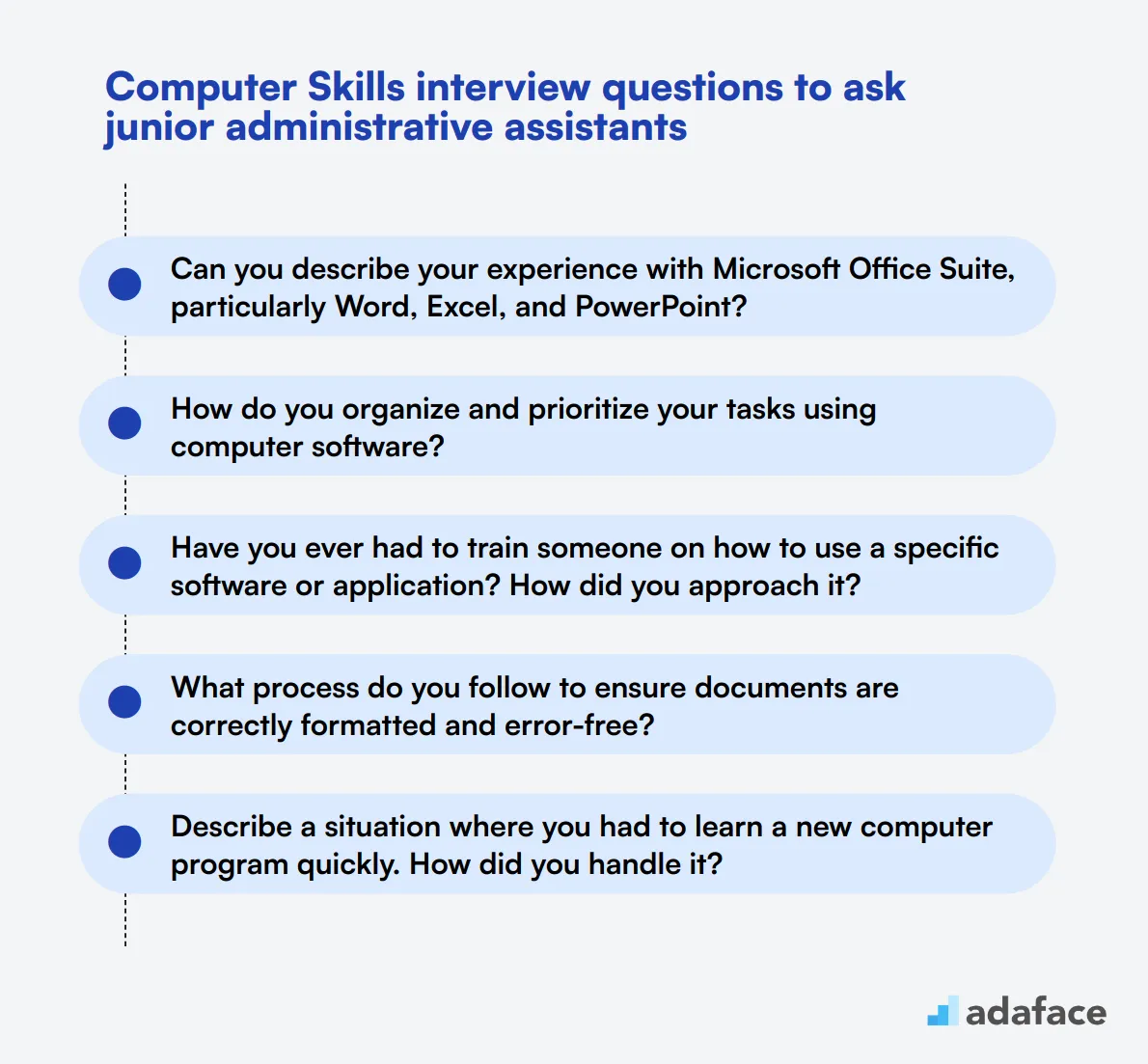
To help you find the right junior administrative assistant with the essential computer skills, consider using these targeted interview questions. These will not only help you gauge their technical abilities but also their problem-solving skills and adaptability.
- Can you describe your experience with Microsoft Office Suite, particularly Word, Excel, and PowerPoint?
- How do you organize and prioritize your tasks using computer software?
- Have you ever had to train someone on how to use a specific software or application? How did you approach it?
- What process do you follow to ensure documents are correctly formatted and error-free?
- Describe a situation where you had to learn a new computer program quickly. How did you handle it?
- How do you ensure compatibility of files when sharing them with others who might use different software?
- Can you explain your approach to handling email management and organization?
- What steps do you take to prevent and troubleshoot common printer or scanner issues?
- How do you handle sensitive information on your computer to maintain confidentiality?
- Can you describe a time when you had to integrate data from various sources into a single report?
- What experience do you have with scheduling and calendar management software?
- How comfortable are you with using cloud storage solutions, such as Google Drive or Dropbox?
- Can you detail your process for setting up a video conference call and ensuring all participants can connect smoothly?
- How do you utilize keyboard shortcuts to improve efficiency in your daily tasks?
- What is your experience with using databases, and how do you ensure data accuracy?
- How do you manage and organize your email inbox to ensure important messages are not missed?
- What techniques do you use to maintain and update contacts in a digital address book?
- Can you explain your approach to creating and editing spreadsheets for data analysis?
- How do you handle software updates and patches for applications you regularly use?
- What steps do you take to ensure the proper functioning and maintenance of office computer equipment?
10 intermediate Computer Skills interview questions and answers to ask mid-tier IT support specialists.
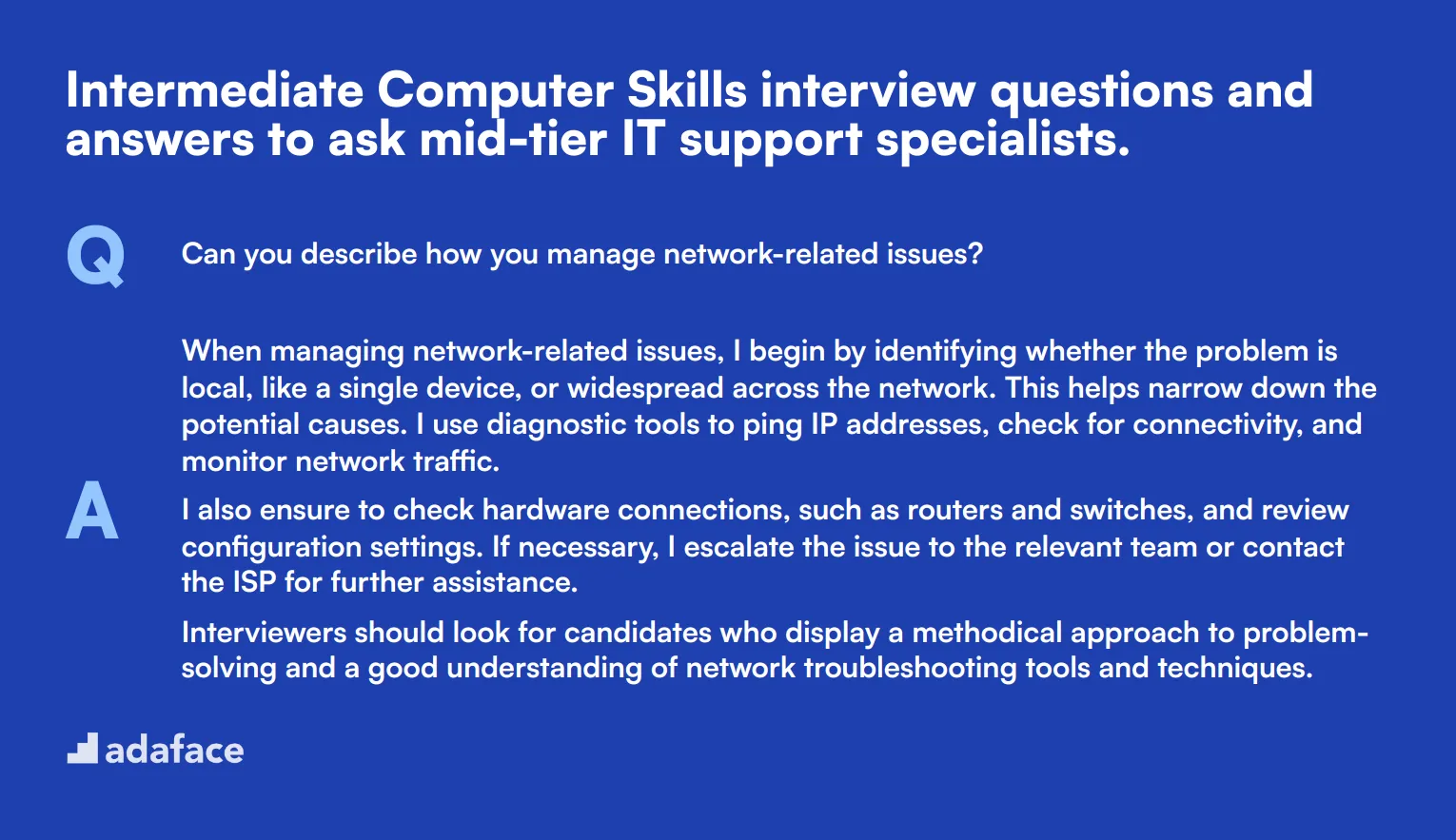
Finding the perfect mid-tier IT support specialist can be challenging, but using these intermediate computer skills interview questions can streamline the process. These questions are tailored to assess the practical knowledge and problem-solving abilities of candidates, ensuring they have the right skills to manage and support IT systems efficiently.
1. Can you describe how you manage network-related issues?
When managing network-related issues, I begin by identifying whether the problem is local, like a single device, or widespread across the network. This helps narrow down the potential causes. I use diagnostic tools to ping IP addresses, check for connectivity, and monitor network traffic.
I also ensure to check hardware connections, such as routers and switches, and review configuration settings. If necessary, I escalate the issue to the relevant team or contact the ISP for further assistance.
Interviewers should look for candidates who display a methodical approach to problem-solving and a good understanding of network troubleshooting tools and techniques.
2. How do you approach software installations and configurations?
For software installations and configurations, I start by ensuring that the system meets the software's requirements. I then follow a systematic installation process, including downloading the software from a trusted source, running the installer, and following the on-screen instructions.
After installation, I configure the software according to the user's needs and the organization's policies. This may involve setting preferences, integrating with other software, and ensuring that all necessary updates and patches are applied.
A strong candidate should demonstrate attention to detail and a thorough understanding of installation procedures, as well as the ability to customize software to meet specific requirements.
3. What strategies do you use to optimize computer performance?
To optimize computer performance, I regularly clean up unnecessary files and applications, manage startup programs, and ensure that the system is free of malware and viruses. Disk cleanup tools and defragmentation can help with this.
I also keep the operating system and software up to date to ensure they run efficiently. Monitoring system resources and upgrading hardware components, such as adding more RAM or a faster SSD, can also significantly enhance performance.
Candidates should highlight their proactive approach to maintaining systems and their knowledge of both software and hardware optimization techniques.
4. Can you explain how you manage user permissions and access control?
Managing user permissions and access control involves setting up and maintaining user accounts, assigning appropriate access levels, and ensuring that users can only access the information and resources they need for their roles.
I utilize tools like Active Directory for centralized management and regularly review access permissions to maintain security. I also implement policies for password management and multi-factor authentication to enhance security.
Ideal candidates should demonstrate a strong understanding of access control principles and the ability to implement and manage them effectively to ensure data security.
5. How do you handle software licensing compliance?
Handling software licensing compliance involves keeping accurate records of all software licenses and their terms of use. I regularly audit the software installed on systems to ensure that all licenses are valid and up to date.
I also educate users about the importance of using licensed software and the potential consequences of non-compliance. Additionally, I work with vendors to understand licensing agreements and ensure that the organization adheres to them.
Look for candidates who demonstrate meticulous record-keeping, knowledge of licensing terms, and a proactive approach to maintaining compliance to avoid legal and financial risks.
6. Can you describe your process for documenting IT issues and solutions?
Documenting IT issues and solutions involves creating detailed records of the problems encountered, the steps taken to diagnose and resolve them, and the final outcomes. I use ticketing systems to log issues, track progress, and ensure timely resolution.
I also create knowledge base articles and documentation to help colleagues and users understand common issues and their solutions. This practice helps improve efficiency and ensures consistent problem-solving approaches.
Candidates should show that they value thorough documentation and understand its importance in maintaining an organized and efficient IT support environment.
7. How do you prioritize and manage multiple IT support requests?
Prioritizing and managing multiple IT support requests involves assessing the severity and impact of each issue. I categorize requests based on urgency, such as critical system failures versus minor user inconveniences, and allocate resources accordingly.
I use ticketing systems to track requests, set deadlines, and communicate with users about the status of their issues. Effective time management and clear communication are key to ensuring that all requests are handled efficiently.
Interviewers should look for candidates who can balance multiple tasks, demonstrate strong organizational skills, and communicate effectively with users and team members.
8. What is your approach to remote troubleshooting and support?
For remote troubleshooting and support, I use remote desktop tools to access and control the user's system. I guide the user through diagnostic steps over the phone or via chat to identify and resolve the issue.
I also provide clear instructions and documentation to help users understand and prevent future problems. Ensuring secure remote connections and maintaining user privacy is crucial in this process.
Candidates should exhibit strong communication skills and the ability to troubleshoot effectively without being physically present, demonstrating their capability to support remote work environments.
9. Can you explain how you handle data recovery in case of accidental deletion?
To handle data recovery in case of accidental deletion, I first check if the data is in the recycle bin or a temporary folder. If it is not, I use data recovery software to scan the storage device for recoverable files.
Additionally, I ensure that regular backups are in place and can be restored if needed. Educating users about proper data management practices can also help prevent accidental deletions.
Look for candidates who have experience with data recovery tools and techniques and who emphasize the importance of regular backups and preventive measures.
10. How do you ensure the confidentiality and integrity of data during transfers?
Ensuring the confidentiality and integrity of data during transfers involves using encryption protocols, such as SSL/TLS, to protect data in transit. I also use secure file transfer methods, like SFTP or VPN, and ensure that both sending and receiving systems are secure.
I implement access controls and authentication mechanisms to restrict data access to authorized personnel only. Regularly updating security measures and monitoring data transfers are also essential practices.
Ideal candidates should demonstrate a thorough understanding of data security protocols and the ability to implement measures that protect data during transfers.
12 Computer Skills questions related to software usage
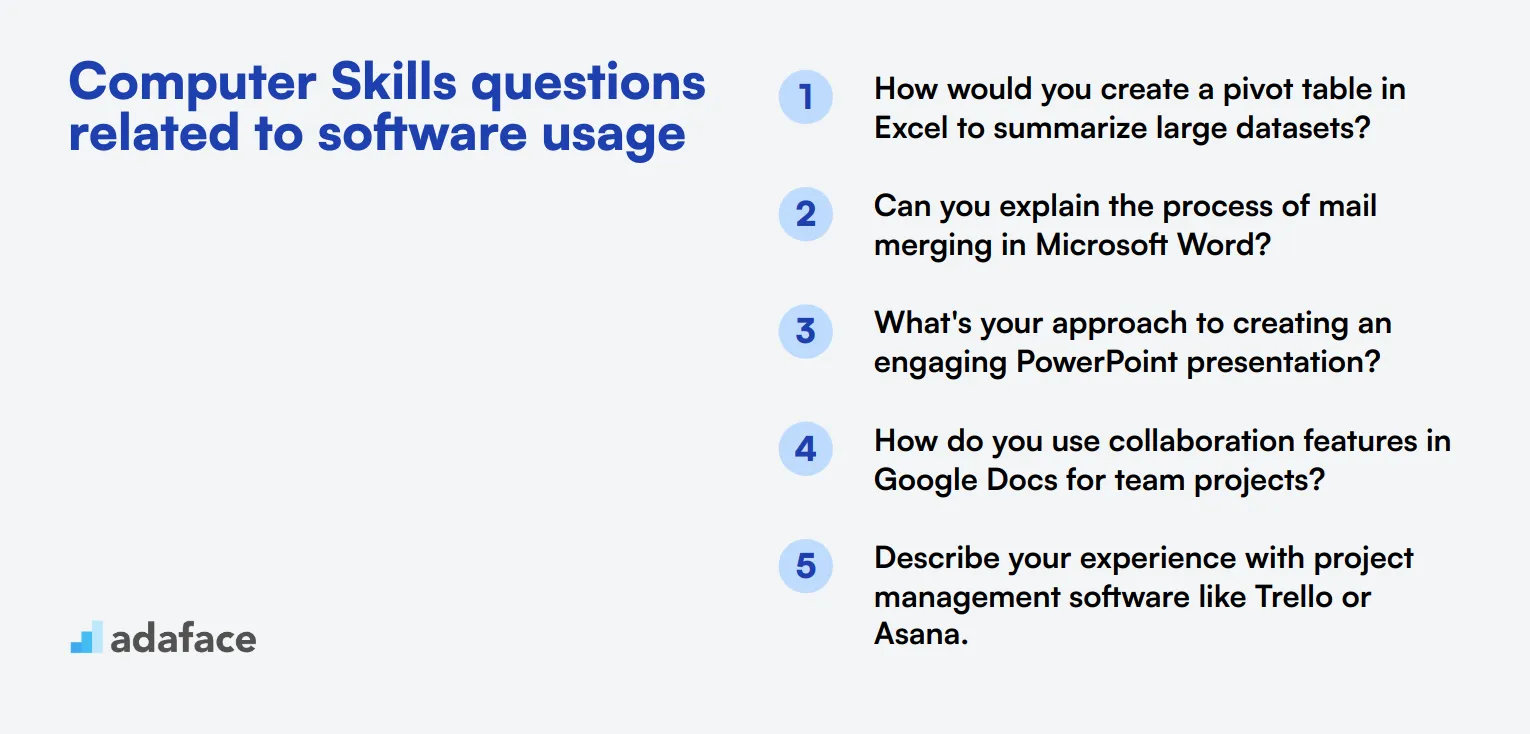
To assess a candidate's proficiency in essential software applications, consider using these 12 computer skills questions. These queries will help you gauge competency in common office tools and productivity software, ensuring your potential hire can hit the ground running.
- How would you create a pivot table in Excel to summarize large datasets?
- Can you explain the process of mail merging in Microsoft Word?
- What's your approach to creating an engaging PowerPoint presentation?
- How do you use collaboration features in Google Docs for team projects?
- Describe your experience with project management software like Trello or Asana.
- How would you set up an automated email filter in Outlook?
- What's your method for creating and managing complex formulas in spreadsheets?
- How do you use version control in collaborative document editing?
- Can you explain how you'd use VLOOKUP or INDEX-MATCH functions in Excel?
- What's your process for creating a professional-looking newsletter in Word?
- How do you utilize macros to automate repetitive tasks in Office applications?
- Describe your experience with data visualization tools like Tableau or Power BI.
8 Computer Skills interview questions and answers related to hardware troubleshooting
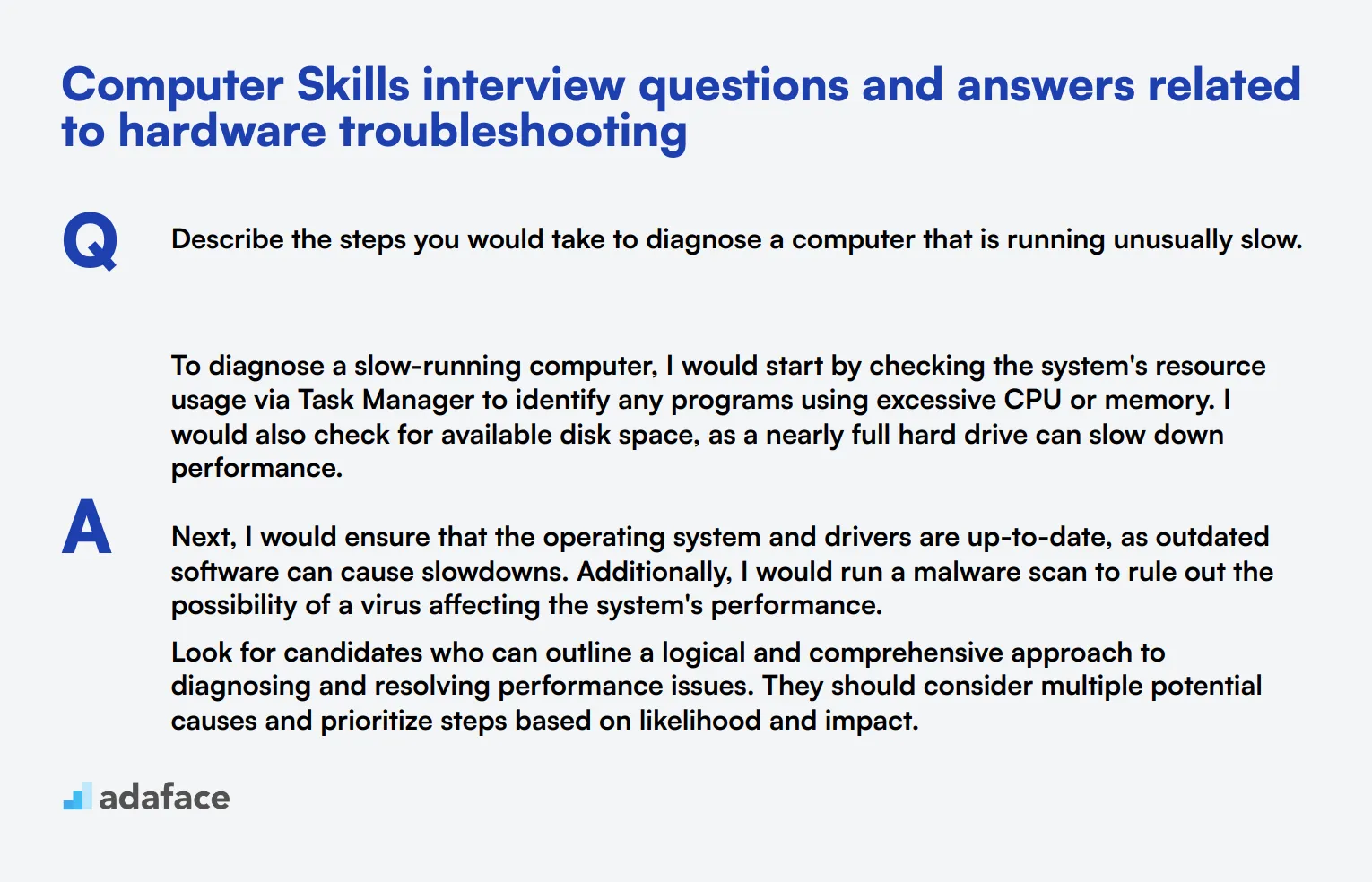
When it comes to hiring for roles that require hardware troubleshooting skills, having a focused set of questions can make the interview process smoother and more effective. This list of questions is designed to help you identify candidates who not only have the technical know-how but also the problem-solving skills needed to excel in hardware troubleshooting.
1. Describe the steps you would take to diagnose a computer that is running unusually slow.
To diagnose a slow-running computer, I would start by checking the system's resource usage via Task Manager to identify any programs using excessive CPU or memory. I would also check for available disk space, as a nearly full hard drive can slow down performance.
Next, I would ensure that the operating system and drivers are up-to-date, as outdated software can cause slowdowns. Additionally, I would run a malware scan to rule out the possibility of a virus affecting the system's performance.
Look for candidates who can outline a logical and comprehensive approach to diagnosing and resolving performance issues. They should consider multiple potential causes and prioritize steps based on likelihood and impact.
2. How do you handle a situation where a computer's screen is not displaying anything when powered on?
First, I would check to ensure that all cables are securely connected and that the monitor is turned on. I would also verify that the monitor is set to the correct input source.
If the connections and settings are correct, I would then test the monitor with another computer to rule out a faulty monitor. If the monitor works, I would proceed to check the computer's hardware, starting with the graphics card and then moving to other components like the motherboard and power supply.
An ideal candidate should demonstrate a methodical approach to identifying and rectifying display issues. Look for answers that show an understanding of both basic troubleshooting and more in-depth hardware diagnostics.
3. What steps would you take if a computer is overheating?
To address overheating, I would first ensure that the computer is in a well-ventilated area and that its vents are not blocked. I would then check the internal components for dust buildup, as this can impede airflow and cooling.
Next, I would verify that all fans are functioning correctly and replace any that are not. I would also consider reapplying thermal paste to the CPU and GPU to improve heat dissipation.
Candidates should demonstrate a thorough approach to resolving overheating issues, including both immediate fixes and preventive measures. They should show an awareness of the importance of proper ventilation and regular maintenance.
4. Can you explain how you would troubleshoot a non-functioning USB port?
First, I would check if the USB port is physically damaged. If it appears intact, I would test the port with multiple devices to determine if the issue is with the port or the device.
Next, I would check the Device Manager for any driver issues or conflicts that could be affecting the USB port. If necessary, I would uninstall and reinstall the USB drivers.
A strong candidate response should include a step-by-step process for diagnosing and resolving USB port issues. They should demonstrate an understanding of both hardware and software factors that could contribute to the problem.
5. How would you troubleshoot a printer that is not connecting to a computer?
To troubleshoot a printer connection issue, I would start by checking the physical connections and ensuring that the printer is powered on. I would also verify that the printer and computer are on the same network if it's a wireless printer.
Next, I would check the printer settings on the computer to ensure it is set as the default printer and that the correct drivers are installed. I would also consider restarting both the printer and the computer to resolve any temporary connection issues.
Candidates should show a systematic approach to identifying and resolving printer connectivity issues. Look for answers that cover both hardware and software aspects, including network settings and driver installations. For more insights on handling printer issues, you can refer to common printer troubleshooting techniques.
6. Explain the process you would follow to recover data from a failing hard drive.
If a hard drive is failing, the first step is to stop using it immediately to prevent further damage. I would then connect the drive to another computer using a USB-to-SATA adapter or an external enclosure to attempt data recovery.
Using specialized data recovery software, I would try to retrieve as much data as possible. If the drive is physically damaged, I would consider sending it to a professional data recovery service.
An ideal candidate should demonstrate a cautious and methodical approach to data recovery. They should emphasize the importance of not causing additional damage and the use of appropriate tools and services for recovery.
7. What steps do you take to resolve a network connectivity issue in a computer?
To resolve a network connectivity issue, I would start by checking the physical connections, such as the Ethernet cable or Wi-Fi adapter, to ensure they are properly connected.
Next, I would verify the network settings on the computer, such as the IP address and DNS settings, and ensure they are correctly configured. I would also check the router and modem to rule out any issues with the network infrastructure.
Look for candidates who can systematically troubleshoot both hardware and software aspects of network connectivity. They should demonstrate a logical approach to identifying and resolving issues, including checking physical connections, network settings, and infrastructure components.
8. How would you diagnose and fix a computer that randomly restarts?
To diagnose a computer that randomly restarts, I would first check for any error messages or logs that might indicate the cause. I would also check the system's event viewer for any relevant entries.
Next, I would consider hardware issues, such as overheating or power supply problems. I would check the temperature of the CPU and other components using monitoring software and ensure that the power supply is providing stable power.
Candidates should provide a comprehensive approach to diagnosing random restarts, considering both software and hardware factors. They should demonstrate an ability to interpret error logs and event viewer entries, as well as check for common hardware issues like overheating or power supply problems.
8 situational Computer Skills interview questions with answers for hiring top data analysts
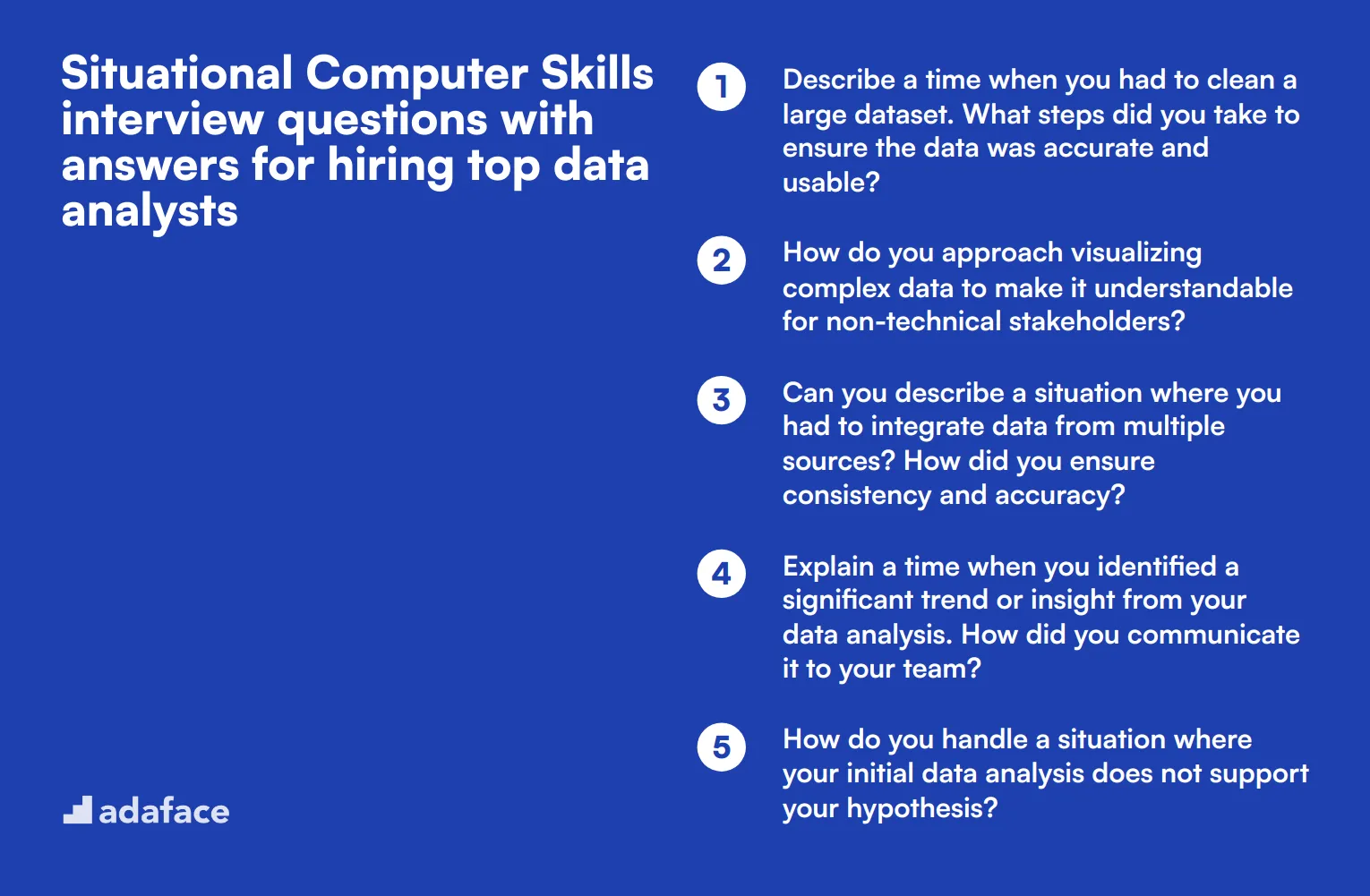
In the dynamic field of data analysis, situational interview questions can reveal how candidates handle real-world challenges. Use these questions to gauge not only their technical skills but also their problem-solving abilities and practical experience.
1. Describe a time when you had to clean a large dataset. What steps did you take to ensure the data was accurate and usable?
When cleaning a large dataset, the first step is to understand the data and its structure. This involves identifying any missing, duplicate, or inconsistent data. I usually start by running some basic descriptive statistics to get a sense of the data quality.
Next, I handle missing values, which can be done by either filling them with appropriate values or removing the affected rows, depending on the context. I also check for and remove any duplicates to ensure the dataset's integrity.
An ideal candidate should mention standard data cleaning techniques such as handling missing values, removing duplicates, and performing data validation. Look for their attention to detail and methodical approach.
2. How do you approach visualizing complex data to make it understandable for non-technical stakeholders?
Visualizing complex data begins with understanding the audience's needs. I start by identifying the key metrics and the story I want to tell. Choosing the right type of visualization (e.g., bar charts, line graphs, scatter plots) is crucial to ensure clarity.
I aim to simplify the data without losing essential details. Using tools like Tableau or Power BI, I create interactive dashboards that allow stakeholders to explore the data at their own pace. Clear labeling and annotations help make the visuals more informative.
Strong candidates should demonstrate their ability to translate complex data into simple, visual narratives. Look for their use of visualization tools and their focus on the audience's understanding.
3. Can you describe a situation where you had to integrate data from multiple sources? How did you ensure consistency and accuracy?
Integrating data from multiple sources requires a thorough understanding of each source's structure and the relationships between them. The first step is to standardize the data by ensuring consistent formats, units, and naming conventions.
I use ETL (Extract, Transform, Load) processes to combine the data, applying transformation rules to harmonize different datasets. Finally, I perform extensive validation checks to ensure the integrated data is accurate and consistent.
Candidates should highlight their familiarity with ETL processes and data transformation techniques. Look for their attention to detail and their method of validating the integrated data.
4. Explain a time when you identified a significant trend or insight from your data analysis. How did you communicate it to your team?
Identifying significant trends often involves analyzing datasets over time and using statistical methods to uncover patterns. Once I discovered a trend, such as a seasonal increase in sales, I prepared a detailed report with visualizations to support my findings.
I presented the insights during a team meeting, using graphs and charts to make the data more accessible. I also provided actionable recommendations based on the trends to help the team make informed decisions.
Look for candidates who can not only identify trends but also communicate them effectively. Their ability to use visual aids and offer actionable insights is key.
5. How do you handle a situation where your initial data analysis does not support your hypothesis?
When initial data analysis doesn't support my hypothesis, I first re-evaluate my assumptions and the methodology used. It's essential to remain objective and open to the data's story rather than trying to fit the data to a preconceived notion.
Next, I explore the data further to understand the underlying reasons. This might involve segmenting the data differently or applying different analytical techniques. If necessary, I adjust my hypothesis based on the new insights.
A strong candidate should show flexibility and a scientific approach to data analysis. Their willingness to adapt and dig deeper into the data when things don't go as expected is crucial.
6. Describe a project where you used data to solve a business problem. What was the outcome?
In one project, our company faced declining customer satisfaction scores. I analyzed customer feedback data alongside operational metrics to identify pain points. The analysis revealed that long wait times were the primary issue.
Based on these insights, we implemented process improvements to reduce wait times. As a result, customer satisfaction scores improved significantly within a few months.
Candidates should provide a clear example of how their data analysis directly contributed to solving a business problem. Look for measurable outcomes and their impact on the organization.
7. How do you ensure the validity and reliability of your data analysis results?
Ensuring the validity and reliability of data analysis involves multiple steps. Firstly, I use clean and relevant data, applying appropriate data cleansing techniques to remove any inconsistencies. Secondly, I choose the right analytical methods and tools suitable for the data and the research question.
I also cross-validate my findings using different datasets or statistical methods. Peer reviews and feedback from colleagues help in identifying any potential biases or errors in the analysis.
Look for candidates who emphasize the importance of data quality and methodological rigor. Their use of cross-validation and peer reviews indicates a thorough and reliable approach to data analysis.
8. How do you stay current with the latest data analysis tools and techniques?
Staying current with the latest data analysis tools and techniques requires continuous learning. I regularly attend webinars, workshops, and industry conferences. I also follow leading data science blogs and read research papers to keep up with new developments.
Participating in online courses and certifications helps me gain hands-on experience with new tools. Collaborating with peers in the data science community also offers valuable insights and practical knowledge.
Candidates should show a proactive approach to continuous learning and professional development. Their engagement with the data science community and commitment to staying updated are good indicators of their dedication.
Which Computer Skills skills should you evaluate during the interview phase?
During the interview phase, it's important to recognize that no single session can provide a complete view of a candidate's abilities. However, for computer skills, there are several key competencies that play a crucial role in job performance. Focusing on these core skills can help you assess a candidate's suitability effectively.
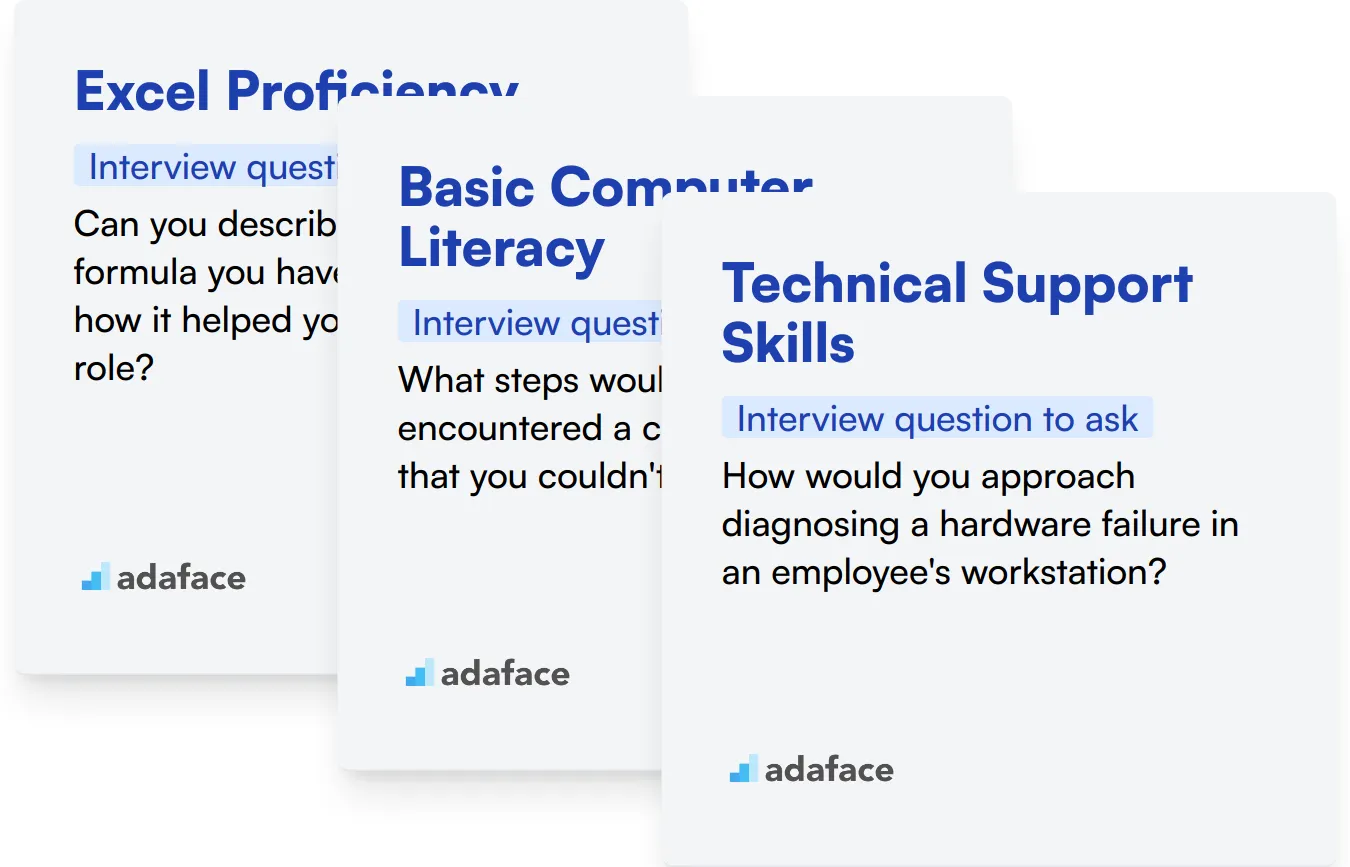
Excel Proficiency
To evaluate Excel skills, consider using an assessment test that includes relevant multiple-choice questions. This can help you filter out candidates who possess the necessary Excel expertise. You can find a suitable test here.
In addition to assessments, you can gauge Excel proficiency through targeted interview questions.
Can you describe a complex Excel formula you have created and how it helped you in a previous role?
Look for candidates who can articulate the problem they faced, the formula they used, and the impact it had on their work. This will demonstrate both their technical skill and ability to apply it in a real-world context.
Basic Computer Literacy
An assessment test with multiple-choice questions can effectively evaluate a candidate's basic computer literacy. You might want to consider this test for a reliable evaluation.
You can also ask specific interview questions to assess basic computer skills.
What steps would you take if you encountered a computer issue that you couldn't resolve?
Listen for a logical approach, highlighting problem-solving skills and familiarity with troubleshooting techniques. Candidates should demonstrate a proactive attitude in seeking help and using resources effectively.
Technical Support Skills
Consider using a well-structured assessment that includes technical support scenarios presented as multiple-choice questions. This method can help you identify candidates with the right skill level for technical support roles.
You might also want to ask targeted questions to evaluate their troubleshooting mindset.
How would you approach diagnosing a hardware failure in an employee's workstation?
Look for a systematic approach where the candidate identifies potential causes, suggests steps for testing, and discusses how to communicate with the affected employee. This reflects their analytical thinking and customer service orientation.
Streamline Your Computer Skills Hiring Process with Adaface
When hiring for computer skills, it's important to accurately assess candidates' abilities. This ensures you find the right fit for your team and avoid costly hiring mistakes.
The most effective way to evaluate computer skills is through targeted skills tests. Adaface offers a Basic Computer Skills Test and a Computer Literacy Test to help you objectively measure candidates' proficiency.
After using these tests to shortlist top applicants, you can invite them for interviews. This two-step process helps you focus on the most promising candidates and make informed hiring decisions.
Ready to improve your computer skills hiring process? Sign up for Adaface to access our test library and start assessing candidates today. For more information on our assessment platform, visit our online assessment platform page.
Basic Computer Skills Test
Download Computer Skills interview questions template in multiple formats
Computer Skills Interview Questions FAQs
Computer skills are critical as they indicate a candidate's ability to efficiently perform tasks, utilize software, and troubleshoot technical issues.
By asking specific questions related to software usage, hardware troubleshooting, and situational problem-solving scenarios.
Key skills include proficiency in office software (e.g., MS Office), basic troubleshooting, and the ability to manage digital files and data.
These questions present real-world scenarios to candidates, assessing their problem-solving and decision-making skills in a practical context.
Focus on the specific tools and software relevant to the role, as well as the level of technical expertise required.
Key qualities include technical proficiency, problem-solving skills, effective communication, and the ability to work under pressure.

40 min skill tests.
No trick questions.
Accurate shortlisting.
We make it easy for you to find the best candidates in your pipeline with a 40 min skills test.
Try for freeRelated posts
Free resources




